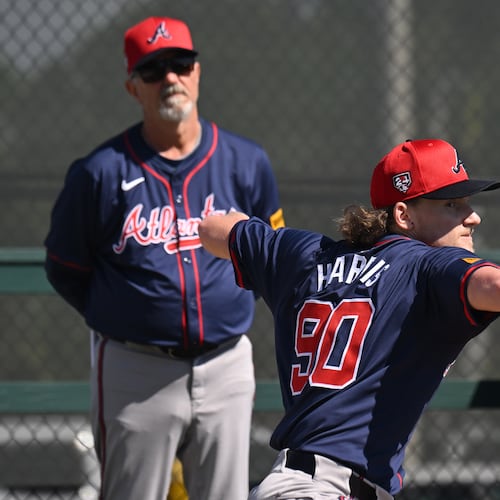Nearly a decade after John Hart last attended baseball’s general managers meetings as an active GM, he’ll be back in the big chair for the Braves when the GM meetings start Monday in Phoenix. He’ll be busy with top aides, including assistant general manager John Coppolella, as the Braves discuss possible trades and other moves.
The meetings once were a casual get-together for GMs to talk a little shop, play a lot of golf and hang out a few days at a beautiful resort. While there still are leisure opportunities, the meetings have increasingly become a time to seed and occasionally finalize trades and free-agent negotiations.
“They’ve definitely changed,” said Hart, who served as GM of the Indians (1991-2001) and Rangers (2002-05) before nine years as a senior adviser. “Back in the day, it was originally set up as a chance for GMs to get together, bring your wives, get together with guys you didn’t get to see a lot during season, more a collegial atmosphere.”
Hart, 66, was hired as Braves president of baseball operations Oct. 23, one month after GM Frank Wren was fired. No one has the Braves GM title now, but Hart has those responsibilities and will delegate more duties to Coppolella.
It’s been an extremely busy time for Hart, who served as interim GM for a month, and Coppolella. They made more than a dozen major personnel changes in scouting and baseball operations. Now, focus turns to the roster.
The Braves expect to keep payroll near last year’s $112 million — CEO Terry McGuirk said it won’t be reduced — and they have about $77 million committed to nine players for 2015. That includes $13 million to Dan Uggla, released in July.
It doesn’t include a $15.3 million qualifying offer to free-agent pitcher Ervin Santana, who was expected to decline by the Monday deadline. The Braves made the offer to assure a compensatory draft pick if he signs elsewhere.
Replacing more than 400 innings pitched by free-agent starters Santana and Aaron Harang figure to be at the top of Hart’s to-do list, along with improving the bullpen — they need a good left-hander — and bolstering the bench and possibly the lineup, although the Braves don’t have any current positions open except possibly second base, where rookies Tommy La Stella and Phil Gosselin handled most of the duties after Uggla left.
If Santana accepts the qualifying offer, it could increase the need to trade a significant salary. Justin Upton’s $14.5 million could be it, since he’s eligible for free agency after 2015 and should get a long-term deal worth well over $100 million.
Returning Braves included in the $77 million: Freddie Freeman, Jason Heyward, Craig Kimbrel, Julio Teheran, Andrelton Simmons and Chris Johnson, who signed multiyear extensions; and the Upton brothers.
Because Heyward and Justin Upton can be free agents after 2015, they and catcher Evan Gattis likely will come up in trade talks. Gattis has 43 homers in 783 career plate appearances and is a year away from arbitration.
His power and low salary are reasons teams want Gattis and are reasons it’s not an easy decision to trade him, given the dearth of power in the Braves’ system.
Justin Upton has 56 homers in two seasons with the Braves and has averaged 24.5 in six seasons. While all-around skills like those Heyward has are increasingly rewarded in today’s game, most teams still save the biggest contracts for starting pitchers and power hitters.
The Braves would trade Gattis because they have catching prospect Christian Bethancourt waiting after two Triple-A seasons and a couple of major-league stints. But they could keep Gattis and play him some in left field.
B.J. Upton is owed $46 million over the final three seasons of a five-year, $75.25 million contract. That coupled with his poor performance in two seasons with the Braves — .198 average, 21 homers, 324 strikeouts — make him all but untradeable, and the Braves will not eat all he’s owed to get rid of him.
Hart recently spent a day with B.J. Upton in Florida, playing golf before meeting for about three hours to discuss where Upton was mentally and what he and the team felt he needs to do to improve on offense and defense. Both sides said the meeting was productive.
Pencil in at another $5 million or so for pitcher Mike Minor and about $5 million combined for relievers Jordan Walden and James Russell, all arb-eligible, and the Braves would have $88 million committed to 11 players on a 25-man roster.
About the Author
Keep Reading
The Latest
Featured

